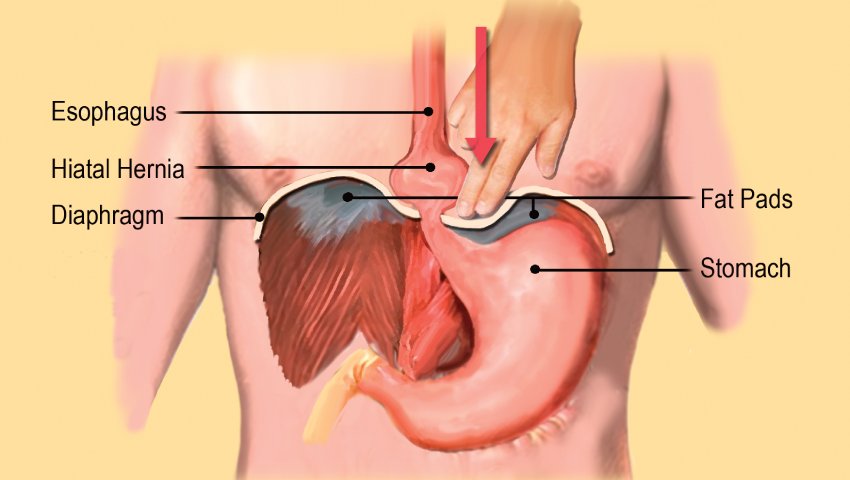
- 16/05/2025
- Mulshi Speciality Hospital
- 0 Comments
- Blogs
Hiatal Hernia & Acid Reflux: When Does It Require Surgery?
Many people in Pune and the surrounding areas suffer from heartburn, acidity, or acid reflux. Hiatal Hernia Acid Reflux Surgery is sometimes needed when these symptoms are linked to a hiatal hernia. But did you know that in some cases, these symptoms may be due to a hiatal hernia? While medications and lifestyle changes can help, there are times when surgery is the only long-term solution. At Mulshi Specialty Hospital, the best gastroenterologist hospital in Pune, patients get accurate diagnosis and expert treatment for conditions like hiatal hernia and acid reflux. But how do you know when it’s time for surgery? Let’s understand more.
What is a Hiatal Hernia?
A hiatal hernia happens when the upper part of the stomach pushes through the diaphragm into the chest cavity. The diaphragm normally helps keep acid in the stomach. When there is a hernia, stomach acid can leak up into the oesophagus, leading to symptoms like:
- Heartburn
- Chest pain
- Difficulty swallowing
- Acid reflux
- Bloating and belching
This condition is common, especially in people above 50 years of age. It can also occur due to obesity, smoking, or constant pressure on the abdomen.
What is Acid Reflux?
Acid reflux occurs when stomach acid flows back into the oesophagus. It causes a burning sensation in the chest, commonly known as heartburn. When this happens frequently (more than twice a week), it is called GERD (Gastroesophageal Reflux Disease). A hiatal hernia is often one of the causes of GERD.
Connection Between Hiatal Hernia and Acid Reflux:
A hiatal hernia weakens the muscle that closes the stomach opening. As a result, stomach acid moves up into the food pipe. That’s why people with hiatal hernia often have long-term acid reflux symptoms.
How is it diagnosed?
At Mulshi Specialty Hospital, the best hospital in Mulshi for gastro-related issues, doctors use several tests to diagnose hiatal hernia and acid reflux:
- Upper GI Endoscopy: A camera is used to see the inside of the food pipe and stomach.
- Barium Swallow X-ray: Helps see the shape of the stomach and diaphragm.
- pH Monitoring: Measures acid levels in the oesophagus.
- Manometry: Tests how well the oesophagus muscles are working.
Early diagnosis ensures better treatment and avoids complications.
Treatment Options:
Lifestyle Changes:
Mild cases of acid reflux or small hiatal hernias can be managed with:
- Eating smaller meals
- Avoiding spicy, oily, and acidic foods
- Losing weight if overweight
- Not lying down immediately after eating
- Avoiding smoking and alcohol
Medications:
Doctors may prescribe:
- Antacids
- H2 blockers
- Proton pump inhibitors (PPIs)
These help control acid production and reduce symptoms.
When Does It Require Surgery?
Not all hiatal hernias need surgery. But sometimes, it becomes necessary. Surgery may be advised in the following cases:
Severe or Chronic Symptoms:
If acid reflux doesn’t improve with medicines and lifestyle changes, and symptoms affect daily life, surgery may be the best option.
Large Hiatal Hernia:
Large hernias can cause the stomach to slide into the chest. This can lead to serious issues like:
- Breathing problems
- Chest pain
- Risk of strangulation (blood supply getting cut off)
In such cases, surgery is required.
Complications:
Untreated acid reflux can cause:
- Ulcers in the oesophagus
- Barrett’s oesophagus (pre-cancerous condition)
- Narrowing of the food pipe
Surgery helps prevent these complications.
Avoiding Lifelong Medications:
Some patients prefer surgery to avoid taking acid-reducing medicines for life. Surgery offers a permanent solution in such cases.
Types of Surgery:
At Mulshi Specialty Hospital, the top gastro hospital near Pirangut and Mulshi, skilled surgeons offer advanced surgical options, including:
Laparoscopic Fundoplication:
- Minimally invasive
- The upper part of the stomach is wrapped around the lower oesophagus
- Strengthens the valve and prevents acid reflux
Hiatal Hernia Repair:
- The stomach is pulled back into place
- The diaphragm opening is tightened
- Often done along with fundoplication
These procedures are safe, have a quick recovery time, and patients usually go home within a few days.
Why Choose Mulshi Specialty Hospital?
- NABH-Accredited: Assures quality and safety in all treatments.
- Expert Gastroenterologists: Highly experienced specialists
- Advanced Diagnostics: Endoscopy, ultrasound, and lab services available in-house
- Multispecialty Care: Support from cardiology, surgery, and medicine departments
- Affordable and Accessible: Located conveniently at Lavale Phata, Pirangut – serving patients from Mulshi, Paud, and nearby areas
Mulshi Specialty Hospital is recognized as the best gastroenterology hospital in Pune for treating complex digestive disorders.
Conclusion:
Hiatal hernia and acid reflux are common but often misunderstood problems. Most people try to manage symptoms on their own, but ignoring them for long can lead to serious health risks. If you’re experiencing frequent heartburn, bloating, or chest discomfort, it’s time to get evaluated. At Mulshi Specialty Hospital, patients receive expert care with compassion. The experienced team will guide you through diagnosis, treatment, and, if needed, surgery with complete support. Don’t let acid reflux take control of your life. Book an appointment with our gastro specialist today and take the first step towards lasting relief! Call us at 8888647102.
